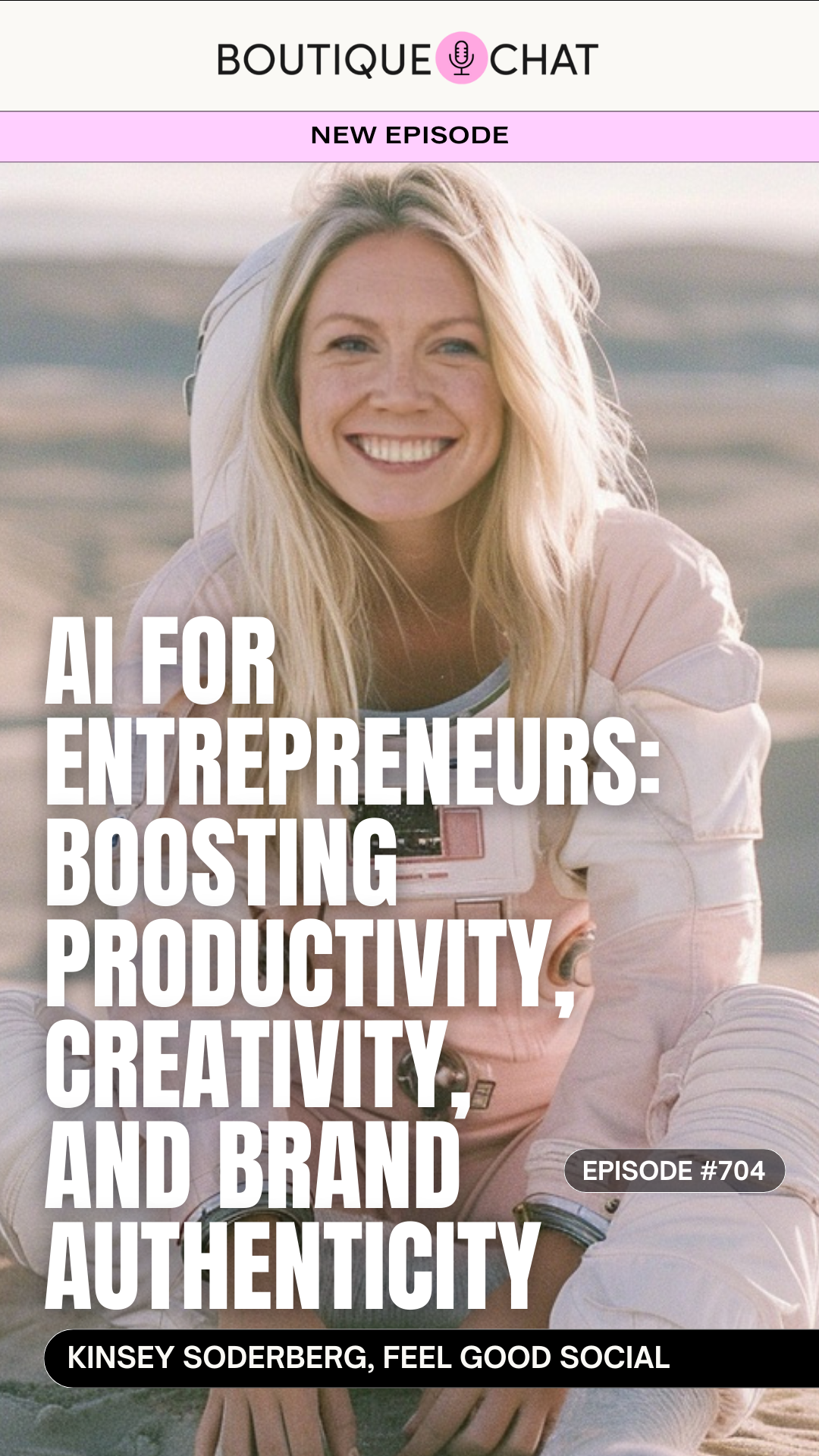

APPLE PODCAST | SPOTIFY | YOUTUBE
Want to save money, save time, be better at content creation, and be a better boss? Who doesn’t? Today, I’m joined by my friend Kinsey Soderberg, owner of Feel Good Social and Authentic AI, and we’re digging into all the different ways you can use AI to make your life easier. She sheds light on how she has been working to find a healthy balance with using AI tools that allows for better productivity without sacrificing quality or authenticity.

AI for Entrepreneurs
AI for Content Planning and Wholesale Buying
For product-based businesses, planning marketing strategies around collections is crucial. AI can help identify your ideal customer, understand their pain points, and recommend collections that solve their problems. Imagine you’re a boutique owner heading to market—AI can help forecast what collections will resonate with your audience six months from now. By feeding it prompts that consider seasonal trends and customer behaviors, you can generate an entire content calendar and buying plan in advance.
AI doesn’t just help with long-term planning—it can also streamline campaign strategies for product launches and seasonal sales. By organizing your ideas into structured marketing plans, AI transforms scattered thoughts into actionable steps.
Customizing AI for Your Personal Work Style
One of the lesser-known advantages of AI tools is their ability to align with your personal workflow. If you tell AI your energy levels throughout the day, it can help you optimize your schedule. Love astrology, human design, or the Enneagram? AI can even integrate personality-based insights into your planning. For example, if you’re a morning person who works best in focused sprints, AI can suggest a content creation schedule that maximizes your peak productivity hours.
AI for Team Management and Communication
AI isn’t just for solo entrepreneurs—it’s a powerful tool for managing teams. From crafting job descriptions to developing interview questions, AI can streamline hiring and training processes.
A particularly insightful use of AI is integrating personality test results into team management. Many businesses already use tools like the Enneagram or human design to better understand their employees. By analyzing these personality insights, AI can suggest customized strategies for communication, motivation, and productivity, helping managers lead their teams more effectively.
One of the most overlooked aspects of AI in the workplace is training employees on how to use it. Simply handing your team access to AI tools isn’t enough. Setting clear guidelines—what AI should and shouldn’t be used for—ensures consistency in brand voice and accuracy in content. Additionally, reminding employees to fact-check AI-generated content before publishing is essential for maintaining quality.
AI Tools Beyond ChatGPT
While ChatGPT is a game-changer, it’s not the only AI tool worth using. Descript is a fantastic resource for video editing, allowing users to edit videos as if they were editing a Google Doc. Its AI features make podcast editing, course creation, and social media content production much easier.
However, with the rise of AI tools comes the temptation to sign up for too many, leading to overwhelm rather than productivity. Setting boundaries with AI is crucial—focus on tools that genuinely improve efficiency rather than getting lost in an endless cycle of new subscriptions. The goal of AI isn’t to replace creativity but to enhance productivity.
Final Thoughts: AI as a Strategic Partner
The real power of AI lies in how you use it. Whether you’re planning a year’s worth of content, structuring wholesale buying strategies, or improving team communication, AI can be an invaluable assistant. The trick is knowing what to ask, setting clear guidelines, and using AI to enhance rather than replace human intuition.
By leveraging AI as a strategic tool, business owners can stay ahead of trends, optimize their workflow, and create stronger connections with their teams—all while maintaining a brand voice that feels authentic and engaging.
In This Episode
- Kinsey Soderberg: Feel Good Social | Authentic AI
- Brand Blueprint
- Reels Prompt Playbook
- AI Powered Reels Club
- Join The Boutique Hub
- Boutique Summit 2025
Let’s Connect #AskAshley
- Have a question or guest recommendation? Let us know your feedback directly here!
- Do you love the Boutique Chat Podcast?! Subscribe to our podcast and after that, leave us a review on iTunes Apple Podcasts here!
Must Have Resources
- The Boutique Hub: Website | Facebook | Instagram | Pinterest | TikTok | YouTube
- Profit First by Mike Michalowicz
- 2025 Boutique Boss Planner
- Boutique Summit 2025
- Small Business Marketing Handbook
- Small Business Hiring Handbook
- Brand Owner Basics Masterclass
- Tradeshow Marketing Handbook
- 2024 Trade Show Calendar
- Boutique Hub Black
- Hubventory.com
Recent Posts:
- Christmas in July: Creative Ways to Clear Inventory & Generate Summer Sales
 Feeling that mid-summer sales slump? Christmas in July is your chance to shake things up, clear out old inventory, and have a little fun while doing it. In this blog, we’re sharing quick promo ideas, event tips, and marketing inspo to help you boost cash flow and make space for fall, all without the holiday chaos.
Feeling that mid-summer sales slump? Christmas in July is your chance to shake things up, clear out old inventory, and have a little fun while doing it. In this blog, we’re sharing quick promo ideas, event tips, and marketing inspo to help you boost cash flow and make space for fall, all without the holiday chaos. - The Boutique Hub is Heading to the PGA Buying Summit!
 The Boutique Hub is heading to the PGA Buying Summit in Frisco, TX for the first time, tapping into the fast-growing golf apparel market projected to hit $13B by 2032. Golf fashion is evolving beyond the course, creating big opportunities for boutique retailers. The Hub team will be connecting with brands, discovering new trends, and offering live education and retail audits at the event on July 28th. Boutique owners interested in athleisure, activewear, or preppy styles should consider adding golf-inspired looks to their lineup. VIP perks available through The Hub’s exclusive registration link.
The Boutique Hub is heading to the PGA Buying Summit in Frisco, TX for the first time, tapping into the fast-growing golf apparel market projected to hit $13B by 2032. Golf fashion is evolving beyond the course, creating big opportunities for boutique retailers. The Hub team will be connecting with brands, discovering new trends, and offering live education and retail audits at the event on July 28th. Boutique owners interested in athleisure, activewear, or preppy styles should consider adding golf-inspired looks to their lineup. VIP perks available through The Hub’s exclusive registration link. - Slow Sales? Ask These 5 Why’s Before You Panic
 Is your cash flow feeling tight but you’re still not paying yourself? In this episode of Five Minute Friday, Sara breaks down one of the most common retail traps: tying up cash in things that don’t bring you a return. From unnecessary trips to market to unused apps, pretty packaging, and impulse inventory buys, these hidden money leaks could be holding your business (and paycheck!) back.
Is your cash flow feeling tight but you’re still not paying yourself? In this episode of Five Minute Friday, Sara breaks down one of the most common retail traps: tying up cash in things that don’t bring you a return. From unnecessary trips to market to unused apps, pretty packaging, and impulse inventory buys, these hidden money leaks could be holding your business (and paycheck!) back.




